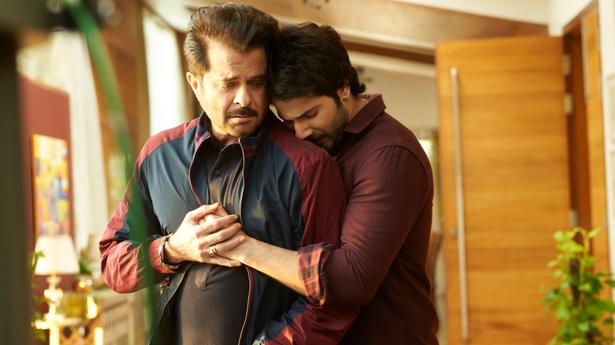
‘Jugjugg Jeeyo’ movie review: Anil Kapoor is the throbbing heart of this dysfunctional comedy that works in parts
The Hindu
Director Raj Mehta’s family drama can evoke a few hearty laughs and some animated dinner table discussions, but the movie ends up only scratching the proverbial surface of male entitlement and chauvinism
What happens when a son on the verge of divorce, discovers that his father is also keen to sever his relationship with his mother? If the son can’t handle the success of his wife... the father wants freedom from his nagging spouse.
Director Raj Mehta tells us that love can dry up in both arranged and love marriages, if they are not nurtured with respect and faith. Ironically, these two ingredients appear to be missing in his treatment of the subject for a large part. There are sequences that raise hopes that the film will say something new, but it ends up only scratching the proverbial surface of male entitlement and chauvinism, to the point of almost normalising them.
In a bid to make the bitter pill palatable, the writers have rolled it in so much saccharine of situational humour that the complex subject loses its potency. That the film is largely set in Patiala is not enough. Every time Maneish Paul comes on screen, somebody has to shout ‘Munda’ (boy) from the background. As the comic treatment dilutes the motivations of the characters, it is not easy to take them seriously. It is only late in the second half that the film finds its muffled voice, when the mother-in-law and daughter-in-law discuss their experience of marriage.
For the rest, it seems the core story of dysfunctional relationships has been gobsmacked with comic background sounds because the makers perhaps don’t have faith in the audience. So they nudge the Karan Johar universe of the Punjabi family ever so lightly. There was a time when only men bonded over wine, now women of the family can also say cheers. That’s progress!
The actors do their bit to make it work. Varun Dhawan has emerged as a competent prototype of a ‘tubelight,’ as Kukoo describes himself towards the end. Kukoo is the kind of guy whose heart is buried somewhere beneath his six-pack abs and requires a few Patiala pegs to light up his brain. Married to his childhood love Naina (Kiara Advani), Kukoo’s fragile male ego flickers when his wife rises up the career ladder and he is left behind to man a nightclub. Her success shakes his male entitlement and makes him feel insecure, a lesser entity in the relationship.
But before Kukoo can break the news of divorce to his father Bhim Saini (Anil Kapoor), Bhim tells him that he is contemplating separation from his mother Geeta (Neetu Kapoor) whom he describes as a ‘vegetarian lioness’ and that Meera (Tisca Chopra), a maths teacher, has brought romance back into his life. It spirals into a series of tragicomic situations; some of which are organic, but others have been forced to keep the narrative light and frothy. Case in point: the scene where Bhim introduces Kukoo to Meera.
In a bid to make Geeta shine, Meera has been reduced to a single-note character. We never get to know what she found in Bhim in the first place, or why Bhim got swayed toward her. Plenty of time is spent telling us that it is not about the late hormonal surge, but the film has no space to discuss the entrenched patriarchy in father and son that has percolated into their wives and sister Ginny (Prajakta Kohli) as well.

‘Love Scout’ K-Drama review: Han Ji-min and Lee Jun-hyuk lead a mature, refreshing workplace romance
‘Love Scout K-Drama’ review: A refreshing, mature workplace romance












